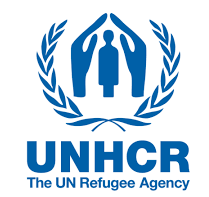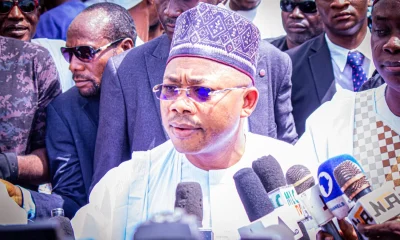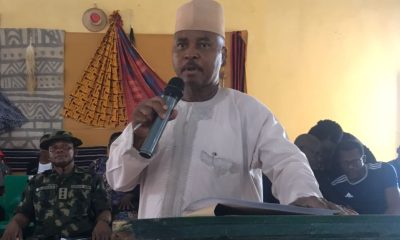Foreign News
UNHCR Restates Commitment to Assisting IDPs in Nigeria, Dep. Country Rep

The United Nations High Commissioner for Refugees (UNHCR) has restated its commitment to helping the government of Nigeria assist refugees and Internally Displaced Persons(IDPs) across the country.
Mr John McKissick, the Deputy Country Representative, UNHCR, spoke on Wednesday in Lagos at a symposium organised to commemorate 70 years of the 1951 Geneva Refugee Convention.
The Refugee Convention protects the rights of people who have been forced to flee their countries, or cannot return to them due to varying circumstances.
McKissick said that Nigeria had talented lawyers to represent refugees and protect them before the courts of law.
According to him, there is room for further development of international refugee law, even in Nigeria, to make the country a model of refugee protection not only in Africa but around the world.
He mentioned that because of the fluid security situation in the northeast, IDPs had not been able to stay home, reintegrate and become thriving members of their community.
Similarly, he added that many of IDP returnees were continuously, making them very mobile and always on the move.
McKissick further applauded the Lagos State government for welcoming refugees into its city.
“Lagos has the highest number of urban refugees in Nigeria, with over 3000 who have been recognized by the government.
“We have the 2000 asylum seekers in Nigeria and over 1600 are in Lagos.
“These refugees come to Lagos for economic reasons and they’re able to start trades, get jobs in order to be self reliant,” he said.
Mrs Imaan Sulaiman-Ibrahim, Commissioner, National Commission for Refugees, Migrants and Internally Displaced Persons (NCFRMI), said that the Refugee Convention remained the chief cornerstone regulatory instrument for international refugee protection.
Without it, she said, other regional and national instruments on refugee protection would be nonexistent.
Sulaiman-Ibrahim, represented by Mr Stephen Medaiyedu said that the commission would continue to provide support and promote initiatives that impact positively on persons of concern.
According to her, the three traditional durable solutions to the global refugee problems of voluntary repatriation, local integration and resettlement have recorded milestone successes.
She said that countries of origin had witnessed successful voluntary returns of displaced citizens from countries of asylum in safety and dignity.
“Under the local solution strategy in Nigeria, the federal government has abolished the encampment policy, hence refugees are either in transit settlements or live in host communities.
“This is in keeping with the tenets of the Global Compact for refugees on burden sharing,” she said.
She noted that there were challenges with the implementation of the Convention by states, however, they were not insurmountable.
She further said that Nigeria had been at the forefront of ensuring digital approaches to addressing issues that cause forced displacement.
This, she said, was being done through the Economic Community of West African States (ECOWAS), and the Lake Chad Basin Commission.
“Nigeria will greatly remain committed and ready to continue to robustly partner with the UNHCR in protecting people who are forced to flee,” she said.
Also, Mr Femi Falana, Human Rights Lawyer, urged Civil Society Organisations(CSOs) to take up the assignment of protecting the rights of refugees.
“Unless we’re ready to do this, it will be difficult for us as citizens to contribute to the implementation of the convention for the protection of refugees.
“We have about 73,000 refugees which is infinitesimal compared to the large population of the country.
“Regarding the position of Nigeria in the region and the entire African continent, we must show leadership and be our brothers keeper,” Falana said. (NAN)
Foreign News
Philippine President Calls for Resignation of All Cabinet Secretaries

Philippine President Ferdinand Marcos Jr. has asked all of his Cabinet secretaries to submit their resignations on Thursday in what he called a “bold reset” of his administration following last week’s mid-term elections.
The elections saw more opposition candidates win crucial Senate seats, signaling shifting political tides.
Marcos, the 67-year-old son of the late Philippine dictator overthrown in 1986, won the presidency in a landslide in 2022, a stunning political comeback marked by a call for national unity.
However, his vice-presidential running mate, Sara Duterte, also widely popular, later distanced herself from Marcos in a falling-out that had sparked intense political discord.
Marcos had since emerged as one of the region’s most vocal critics of China’s aggression in the disputed South China Sea, bolstered by support from the United States and other allies. Domestically, he continued to face significant challenges, including high inflation, unfulfilled promises to lower rice prices, and growing concerns over kidnappings and other crimes.
“This is not business as usual,” Marcos said in a government statement.
“The people have spoken and they expect results, not politics, not excuses. We hear them and we will act.” (AP/NAN)
Foreign News
Pakistan Blames India for School Bus Attack That Killed 5

Three children and two adults were killed in a blast on Wednesday that targeted a school bus in south-western Pakistan, with Islamabad blaming India for the attack.
Terrorists targeted the bus in the city of Khuzdar, in the restive province of Balochistan, as it took students to a military-run school, Balochistan Chief Minister Sarfraz Bugti said.
Preliminary findings suggested that it was not a suicide attack, he said at a press conference.
The dead included three young girls who were students of grades 6, 7 and 10. More than 40 students were wounded, many of them said to be suffering severe wounds.
Bugti said that his government had intelligence reports that Indian National Security Advisor Ajit Doval was planning something in Balochistan but did not expect him to target innocent children.
“After facing a humiliating defeat on the battlefield, India has resorted to despicable and cowardly acts,” the media wing of Pakistan’s military said in a statement.
“Planners, abettors and executors of this cowardly Indian sponsored attack will be hunted down and brought to justice and heinous face of India will be exposed in front of the entire world,” the statement added.
Prime Minister Shehbaz Sharif will make an emergency visit to the province where he would be briefed on the attack by terrorists, allegedly backed by India, said a statement issued by his office.
The Baloch Liberation Army (BLA), a rebel group fighting for the independence of the region from Pakistan, earlier claimed it targeted the bus, but said it was transporting the soldiers.
Islamabad claims that the BLA is backed by India.
Violence orchestrated by sub-nationalist rebels has surged in Balochistan, a region that borders both Afghanistan and Iran, and is a hub of Chinese investment and connectivity projects.
Earlier this month, India and Pakistan carried out tit-for-tat drone, missile and airstrikes targeting each other’s military installations and airbases.
The nuclear-armed rivals agreed to the ceasefire on May 10 but continue to accuse each other for terror incidents. (dpa/NAN)
Foreign News
Thousands Protest in Pakistan After Drone Strike Kills 4 Children

Thousands of people in north-west Pakistan on Tuesday blocked a highway by placing the coffins of four children who were killed by a suspected drone strike.
The protests in the Mir Ali area of North Waziristan region began earlier on Monday after a family home was hit, local resident Mohamed Jamal Dawar said.
It is not clear who was behind the incident.
Local activist Zahid Wazir said the drone was operated by the Pakistani military.
He said the home was likely mistaken as a hideout used by Islamist militants.
Pakistani intelligence officials said the explosives were fired by a quadcopter that was being operated by the Taliban militants to target a nearby military post, but that it missed the target.
An independent verification was not possible as the region is inaccessible to outsiders.
Activists of a local rights group, the Pashtun Tahafuz Movement, which is against the militarisation of the region by both the military and the Pakistani Taliban, vowed to continue the protest.
“We will continue to demand justice for our kids,” Wazir said.
The Pakistani military and Islamist militants have been fighting each other in the region for more than two decades.
More than 80,000 Pakistanis, an overwhelming majority of civilians, have lost their lives in years of violence. (dpa/NAN)




























